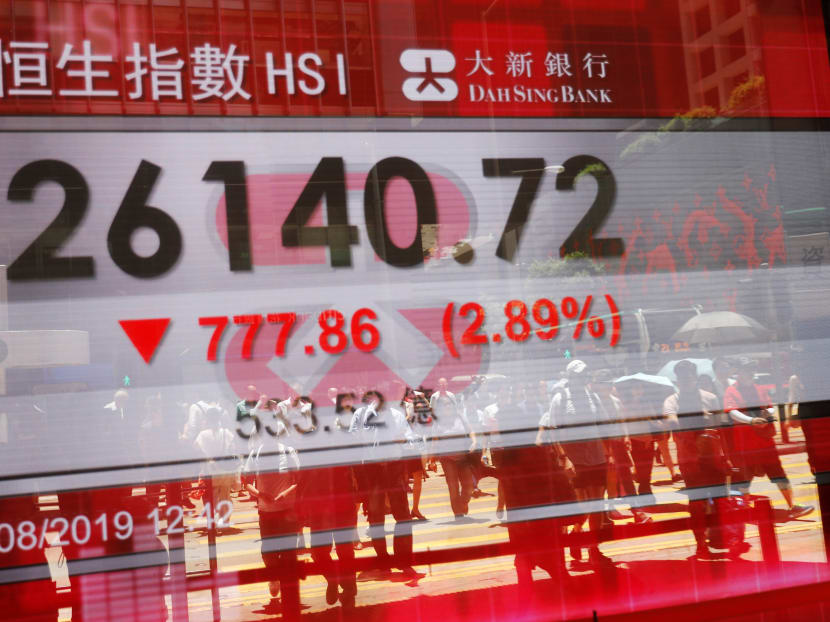Singapore-listed firms with operations in Hong Kong see share prices hit by unrest
SINGAPORE — The share prices of Singapore-listed companies with significant operations in Hong Kong took a tumble on Monday (Aug 5) amid ongoing unrest in the city.
SINGAPORE — The share prices of Singapore-listed companies with significant operations in Hong Kong took a tumble on Monday (Aug 5) amid ongoing unrest in the city.
Adding on to market woes is the ongoing trade tensions between the United States and China, with China firing its latest salvo by allowing its currency to slide to its weakest level in more than a decade — a response to new tariffs on US$300 billion (S$415 billion) in Chinese goods.
Among some of the worst performers on the Straits Times Index (STI) were Jardine Matheson Holdings (-5.7 per cent), Hongkong Land (-4.65 per cent) and DBS (-3.66 per cent) — companies that have a large exposure to the Hong Kong economy, analysts pointed out.
The STI closed 2 per cent lower at 3,194.51, down 66.6 points.
Analysts also believe that the crisis will be a protracted one, with no resolution in sight soon.
Ms Pan Jingyi, a market strategist at trading firm IG Singapore, said of the protests in Hong Kong: “There is not much middle ground between the authorities and the general public.”
In the short term, analysts expect further economic slowdown in Hong Kong for the third quarter, with some even predicting a technical recession.
As for the long term, Ms Margaret Yang, a market analyst for trading firm CMC markets, said that the city’s uncertain political climate and its deteriorating relationship with mainland China "will dampen Hong Kong’s growth prospect and probably expedite capital outflow".
However, some market watchers said that it is hard to delineate whether the cause of the recent sell-off is the US-China trade war or Hong Kong’s domestic political crisis that have gone on for nine weekends.
“It’s hard to discern between the two. Both matters have implication on the performance of the stocks,” Ms Pan said.
RETAIL AND BANKING SECTORS HIT
In particular, the retail, tourism and banking sector have been badly hit, analysts noted.
Singapore banks have been on a buying spree in Hong Kong over the last few years. For example, DBS acquired ANZ’s Hong Kong retail and wealth business in 2016 and Oversea-Chinese Banking Corporation (OCBC) took over Wing Hang in 2014.
Mr Jack Wang, a partner at financial advisory firm Lexico Advisory, said that with substantial operations in Hong Kong, these banks would be affected.
Besides DBS, OCBC’s share price also closed lower by 1.16 per cent on Monday.
However, the situation for the banks is not dire yet due to their significant operations in Singapore and other parts of Asia outside Hong Kong, Mr Wang said.
The long-term concern is if companies and businesses start to default on their loans, if things in Hong Kong “get out of control”, he added.
Mr Paul Chew, the head of research at securities firm PhillipCapital, said that the retail sector is bearing the brunt of the crisis, with retail sales in Hong Kong in June this year falling by 6.7 per cent compared to a year ago, and expectations of a double-digit drop for July and August.
Jardine Matheson’s retail arm, Dairy Farm, which operates supermarkets and convenience stories in Hong Kong and other parts of Asia, is also impacted. Its share price was down 3.82 per cent on Monday.
The share price of Fortune Reit, a real estate investment trust that owns 17 suburban malls in Hong Kong and is also listed in Singapore, closed 3.16 per cent lower.
With both the trade war and Hong Kong’s political crisis not likely to cease any time soon, and with elections in Taiwan coming up early next year, analysts said that investors would continue to remain cautious.
Ms Yang expects the sell-off momentum to continue as investors are pricing in heightened trade and economic risk in the equity market, even for companies that are diversified.
“Now is probably not the best time to buy the dips, because stocks may get cheaper in the weeks to come,” she said.









